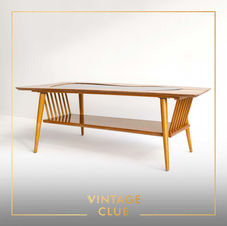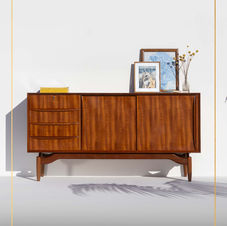SPOTLIGHT ON
MCM Furniture Designers & Makers
(A work in progress...)
Duros, South Africa
Duros, established in 1904 represented Danish modern style in South Africa. The name Duros was a composite of the Latvian emigrant family name OSpovat and "DURablity".
The Duros furniture company opened it’s doors in Chapel Street, Woodstock in 1903, moved to Roeland Street in the 1930’s and remained there until it’s demise in the 1980’s. It had an impressive range of furniture
Duros founder Hyman Ospovat gave the company a slogan taken from John Keats: “A thing of beauty is a joy forever”. Looking at how timeless his furniture pieces are, it’s rather accurate.
'The founders of the Duros factory in Woodstock, at the beginning of the previous century, were Latvian father and son Hyman and Isaac Ospovat. They settled in South Africa in 1904 and became citizens. Throughout the years the Ospovats shopped for veneers and designers in Europe and while Isaac served 29 years as a City of Cape Town ward councilor, campaigned for the rights of workers and believed in paying better wages than his competitors in the furniture business in the name of quality products.'
- reference https://huisraad.co.za/
For close on a century, the Duros label was to be found on at least one piece of furniture in many South African homes - even if it was only a mattress.
Many styles of furniture were manufactured by Duros. But for the collector of period furniture, more important than the household name was the impressive range of furniture in the Art Deco style that the Duros trademark has left us. The Duros story, remarkably, is one that is part and parcel of the social and industrial fabric of South Africa's Mother City. It begins in 1903. Like so many entrepreneurs who helped build South Africa's industrial base early in the 20th century, Hyman Ospovat arrived in Cape Town
from the Russian shtetl he'd grown up in a year after the close of the South African War: H Ospovat & Co (Ltd) opened its doors in Chapel Street, Woodstock on the outskirts of the city centre. To his shrewd eye for business must be added the luck of timing. The war had left Cape Town as perhaps the only urban centre in the country that had gained financially from the war: Being the port of entry did help! However, initially commerce and industry suffered from a severe post-war slump, which Ospovat was able to survive
- the business operated from its Chapel Street premises until a disastrous fire on Tuesday, 23 January 1940. Thereafter, the business was re-opened in new premises in Roland Street, where it remained until its demise in the 1980s.
Hyman quickly seized the opportunity to manufacture suitable household furniture - everything from dining suites to bedroom suites, cots to mattresses - under the 'Duros' label, a brand name he coined from Durability + Ospovat, together with a slogan from Keats: 'A thing of beauty is a joy for ever. An ardent Anglophile, he drew his ideas from England, even to the point of importing his foreman, a Mr Trew, from there. Interestingly, he was to visit the United States only much later; after he had relinquished control of the business. The company grew to have agencies in Port Elizabeth, East London and Durban, and also in Windhoek in what was then South-West Africa. Johannesburg was the exception: not only was there stiff competition from newly established local firms, but the endemic South African problem - the cost of inland transport - was also an inhibiting factor to breaking into that market.
The second generation at the helm of Duros was represented by Isaac, who had landed with his father aged 3. At 15 he was already attending meetings of the Furniture Manufacturers Association in short trousers! He went on to become the financial brain of the company. He also became steeped in public life as a city councillor and alderman of the City of Cape Town.
The culture of the business was described, at the time, as 'organised'
'fanatical', 'Tartar-driven'. It is said that nothing in the works was allowed to be left out of place. It is also said that for generations there was not a wedding in Cape Town where Duros did not feature as part of the wedding gifts in some form or other. One sign of the firm's success and influence was that, for the |947 Royal Visit Duros was commissioned to supply the lounge suite for the Royal Train.
The absence of retail print advertising is due to Duros being a manufacturer and wholesaler pure and simple, and it appears that the Ospovat patriarchy maintained this as a strict policy prior to World War Il Only in the post-|945 period did they move into cinema advertising, perhaps because of increasing competition from other manufacturers
Read more here












